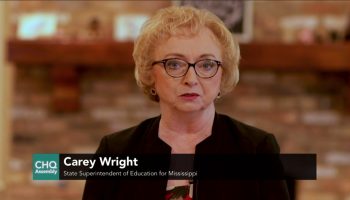When Carey Wright began her position as Mississippi state superintendent in 2013, she was met with a culture of low expectations for student performance. She knew that had to change.

“Children can do and will do what you tell them they can and will do, and support them in doing it,” Wright said. “That’s been my foundational belief my entire life as an educator, and we’ve proved that possible here in a state (where) I don’t think they thought it was possible.”
In the seven years since she started in her position, Mississippi public schools have made massive gains in education. In 2020, Education Week’s Quality Counts ranked Mississippi second in the nation for improvement in education. Student participation has doubled in Advanced Placement classes. Student achievement on the National Assessment of Education Progress improved at a rate faster than the majority of the country.
At 10:45 a.m. EDT Friday, Aug. 7, on the CHQ Assembly Video Platform, Wright will present the story of Mississippi’s education reformation as part of Week Six’s Chautauqua Lecture Series theme, “Rebuilding Public Education.”
“The major theme (of the lecture) is really about the historic education achievement gains that Mississippi has made. It’s really the story of how this came to be, and the policies and processes that we put in place, belief systems that we used to drive our work, etc.,” Wright said. “This is really kind of a detailed story of Mississippi before and Mississippi now.”
Wright spearheaded many initiatives responsible for these gains, including several key pieces of legislation.
In 2013, the Early Learning Collaborative Act was established, providing Mississipians their first public pre-K program funded by the state government. The same year, the state passed the Literacy-Based Promotion Act which required third-grade students to pass a literacy test before advancing to the fourth grade. Along with this, tests were mandated for new elementary teachers to ensure they understood the foundation skills and science of reading.
“For me, the classroom has always been my heart. I started out as a teacher, then was an elementary school principal for a number of years. I just really believe that the magic takes place in the classroom. So, if we could do the best that we could to build teacher capacity in order to teach what we knew they needed to be teaching, … it would pay off for us,” Wright said. “I really invested in teachers and in their professional development. We more than doubled down on the amount of professional development we have been providing teachers across the state.”
During this process, Wright reached out to the Region Education Laboratory, an educational research center, to observe the classroom consequences of Mississippi’s new legislation. After observing hundreds of teachers across the state, REL and Wright found that teachers felt more secure in their understanding of the science of reading after their professional development.
At the same time, Wright and the public school system also wanted to bring reform to high schools.
“We found that not all high schools were offering Advanced Placement — so we had an Advanced Placement initiative and it more than doubled the number of kids not only enrolled in Advanced Placement, but it also took our pass rate to an all-time high,” Wright said. “So, it let me know that there were a lot of kids out there that needed that access, but weren’t getting it.”
Wright’s expectations were set by her time as an educator across the country. She began her career as a teacher for second through sixth grades, and moved onto an elementary principal position in Maryland. Wright then moved to Washington D.C. to work in an education administration position before moving to Mississippi in 2013.
In her time as an educator, Wright has learned to use a research-based approach when setting standards and reforming education. She urges other educators to look at the research, base their policy around that and then stick to it, no matter how tedious the journey is.
Above all else, Wright believes that educators should stress the importance of literacy at an early age.
“Reading is the gateway to every other subject in the world. We need to ensure that all of our children are strong readers,” Wright said. “That, to me, is … the big essence of my presentation, that you’ve got to focus first (in literacy).”
This program is made possible by the George and Julie Follansbee Family Fund.




